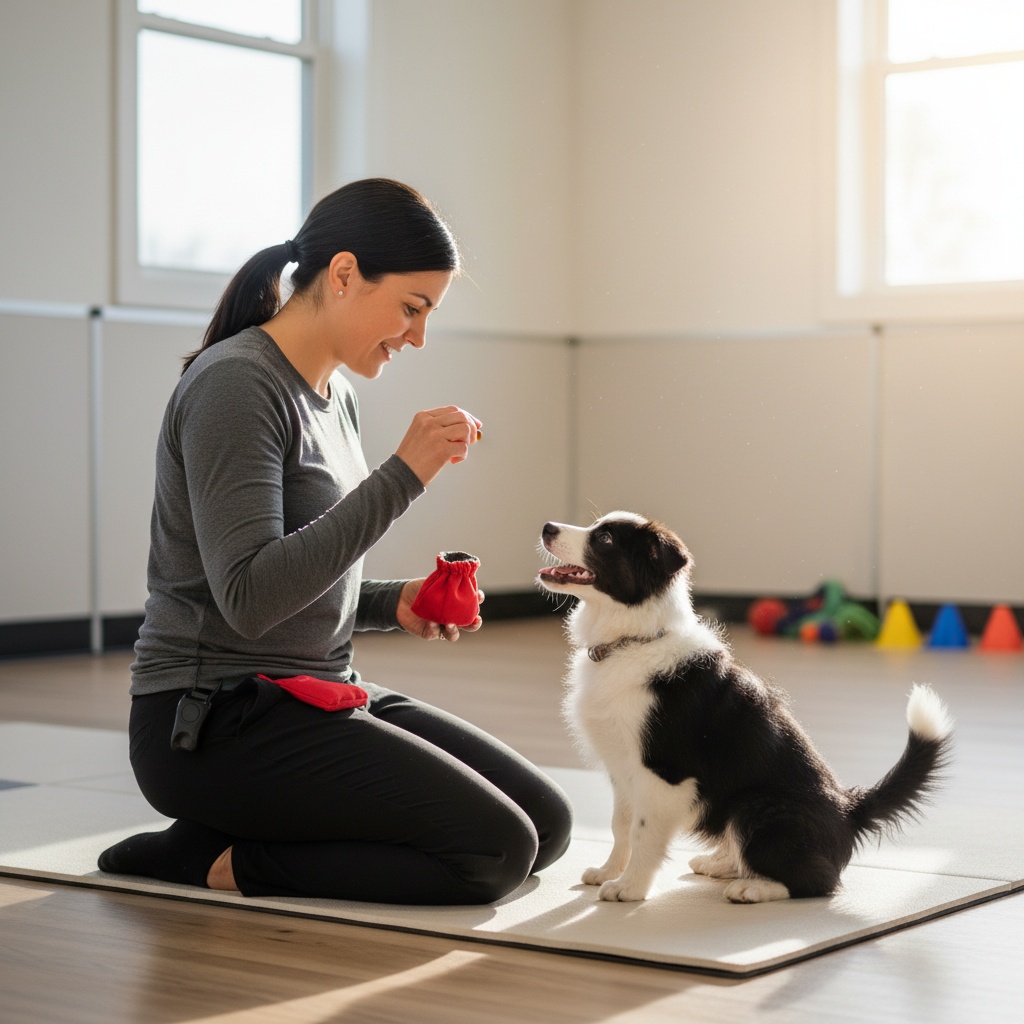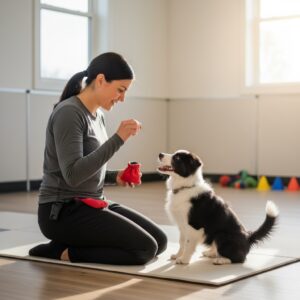Choosing a Puppy Trainer in Charlottetown: What PEI Dog Owners Should Know
When it comes to your dog’s training and well-being, you have several options available in Charlottetown and across Prince Edward Island. From group classes to private coaching to professional behaviour consultants, understanding the differences between these approaches helps you make the best decision for your puppy and family. As certified dog behaviour and training experts serving PEI, we want to help you navigate these choices with confidence.
Understanding Different Training Approaches in PEI
Dog training in PEI ranges from DIY methods to group classes to comprehensive professional behaviour programs. Each approach serves different needs, and understanding what distinguishes them helps you choose the right fit for your puppy’s specific situation.
Group Puppy Classes
Many pet-related businesses and big box stores offer group puppy classes that focus on basic obedience and socialization. These programs typically:
- Follow a one-size-fits-all curriculum
- Emphasize teaching basic commands through repetition
- Provide limited individual attention in large group settings
- Run for a set number of weeks (often 6-8 sessions)
- Provide limited follow-up after the course concludes
Professional Behaviour Training and Coaching
Professional behaviour consultants and certified trainers provide comprehensive education that addresses the whole dog and family system:
- Customized programs based on individual dog temperament and family needs
- Science-based positive reinforcement methods proven effective by modern research
- Small group sizes or individual sessions for personalized attention
- Ongoing support and guidance throughout your dog’s life
- Focus on building relationships and communication, not just compliance
- Ability to address complex behavioural issues and prevent future problems
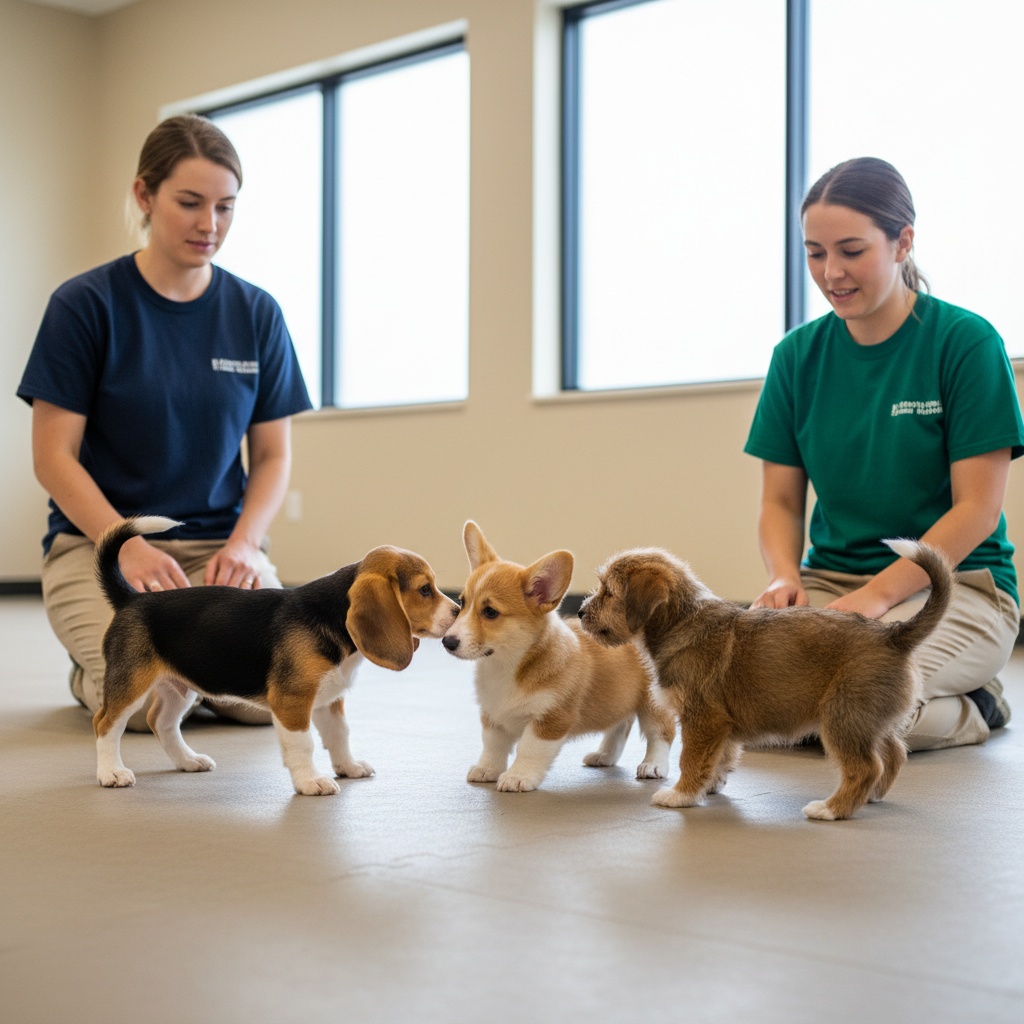
What Puppies Actually Need During the Critical 8-16 Week Window
Research in canine development shows that puppies have specific needs during their early months that determine their lifelong behaviour patterns:
Individualized Socialization: Exposure to new experiences at the puppy’s own pace, with the ability to retreat if overwhelmed. Large group settings don’t allow for this individualized approach, and moving too fast can create fear responses that last a lifetime.
Prevention-Focused Training: Identifying and addressing small concerns before they become problems. Teaching life skills beyond basic commands—settling, impulse control, body handling—and establishing communication patterns between puppy and family.
Ongoing Professional Guidance: Adjusting training as the puppy develops through different stages, with support during fear periods, teething, and adolescence. Connection to veterinary resources when needed.
This is why many families choose professional behaviour training even when their puppy doesn’t have “problems”—they want to ensure their puppy never develops them.
Why Timing Matters: The Prevention Advantage
The most common mistake we see is families waiting to see if problems develop before investing in training. The research is clear: Training during the critical 8-16 week period is exponentially more effective than addressing problems later.
Neural Development: Puppies’ brains are most receptive to learning during this window. Positive experiences create lasting neural pathways.
Socialization Period: The window for safe, positive socialization closes around 14-16 weeks. Missing this window can lead to fear and reactivity later.
Habit Formation: Behaviours practiced during puppyhood become lifelong patterns. Teaching appropriate behaviours from the start is easier than changing established habits.
Cost-Effectiveness: Preventing problems is significantly less time-consuming and expensive than addressing entrenched behavioural issues.
This is why our Puppy Prep School focuses on puppies aged 10-16 weeks—not because they have problems, but because this is when professional guidance has the greatest impact.
What Professional Certifications Mean for Your Puppy
Dog training is an unregulated industry in Canada, which means anyone can call themselves a dog trainer regardless of education or experience. Understanding professional certifications helps you identify trainers with verified expertise.
Key Certifications to Look For
CBCC-KA (Certification Council for Professional Dog Trainers): Identifies trainers who have passed rigorous examinations on dog behaviour, learning theory, and training techniques. CBCC-KA certified professionals are behaviour consultants, not just obedience instructors.
CDBC-IAABC (International Association of Animal Behavior Consultants): Signifies a high level of achievement and experience in handling complex and challenging dog cases.
KPA-CTP (Karen Pryor Academy Certified Training Partner): Graduates have completed extensive hands-on training in positive reinforcement methods and modern learning theory.
Continuing Education: Professional certifications require ongoing education. CBCC-KA and KPA-CTP certified trainers must complete 10-12 hours of continuing education annually for each certification.
Critical Questions to Ask Any Trainer
Because dog training is unregulated, these specific questions help you identify truly ethical, science-based trainers and avoid those using outdated or harmful methods:
About Methods and Tools
- “Do you or have you ever used e-collars (shock collars), prong collars, slip leads, or other aversive tools in your training?”
- “Are any of your certifications through organizations that permit the use of aversive tools?”
- “Do you believe there are situations where punishment or corrections are necessary in dog training?”
Red flag answers: “Yes, for certain behaviors,” “Sometimes, for safety,” “It depends on the dog”
Good signs: “No, there are always force-free alternatives,” “Research shows punishment damages the relationship and isn’t necessary,” “We can achieve all training goals through positive reinforcement”
About Program Structure
- “Do you have an option for individual assessments before starting training?”
- “What’s your trainer-to-puppy ratio?”
- “What support do you provide after the initial training period?”
- “What happens if my puppy isn’t progressing at the expected pace?”
About Qualifications
- “What professional certifications do you hold, and which organizations issued them?”
- “How many hours of continuing education do you complete annually?”
- “What is your educational background in animal behaviour and learning theory?”
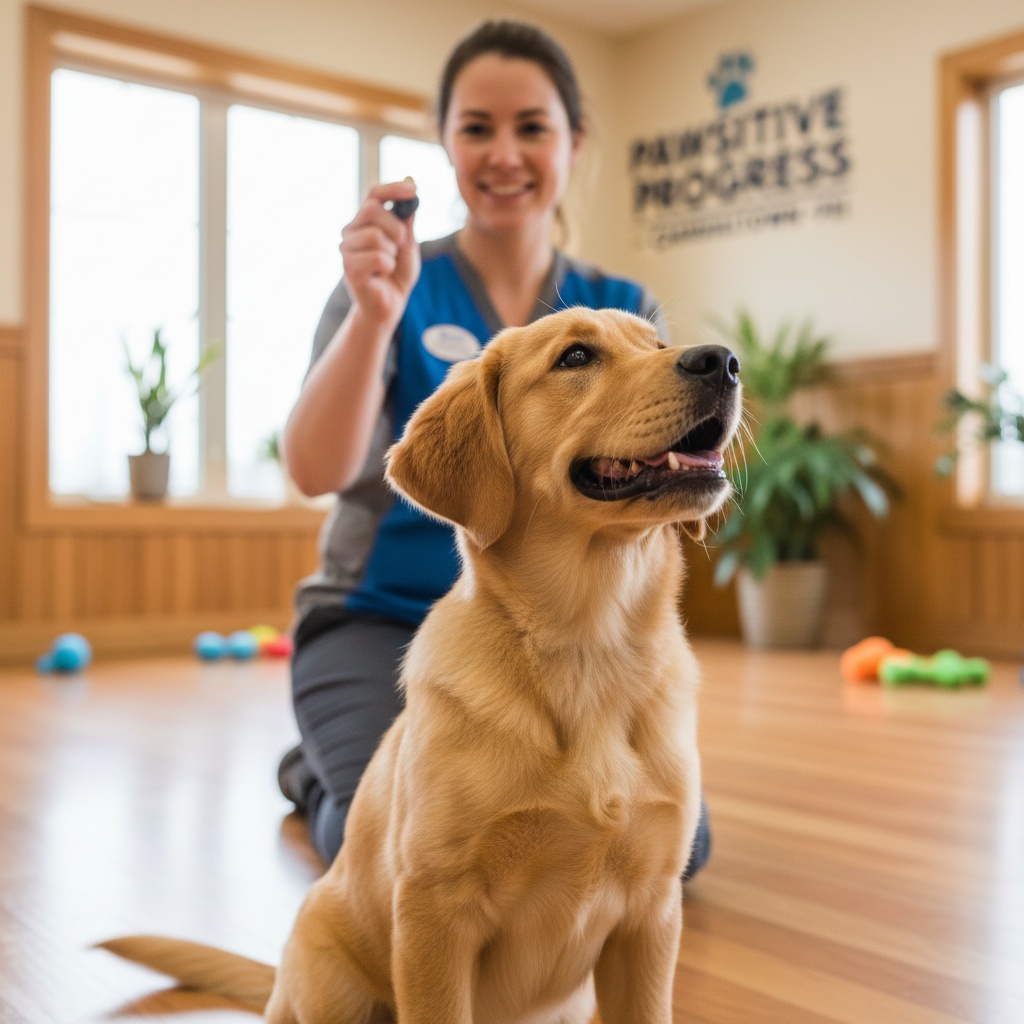
Science-Based Methods vs. Outdated Techniques
Modern animal behaviour science has given us clear evidence about what training methods work best for long-term success and the human-dog relationship.
What Modern Positive Reinforcement Looks Like
At Spot On Dogs, we use evidence-based techniques including:
- Pattern Games: From Control Unleashed, creating engagement and predictability that reduce anxiety
- Behaviour Adjustment Training (BAT): Giving dogs agency in their learning and promoting natural desensitization
- Errorless Learning: Building behaviours without mistakes or frustration, especially important for young puppies
- Counter-conditioning: Changing emotional responses to triggers rather than just suppressing reactions
- Functional Assessment: Understanding why behaviours occur so we can address root causes
Outdated Methods Still Common in PEI
Because dog training is unregulated, some trainers still rely on techniques that modern science has shown to be less effective or potentially harmful:
- Dominance-based training that creates fear and anxiety
- Methods that temporarily suppress behaviours but create long-term problems (punishment-based methods, alpha rolling, “Tssk-ing”)
- Aversive equipment like prong collars, especially for puppies
- Coercive implementation that causes frustration and damages the relationship with training
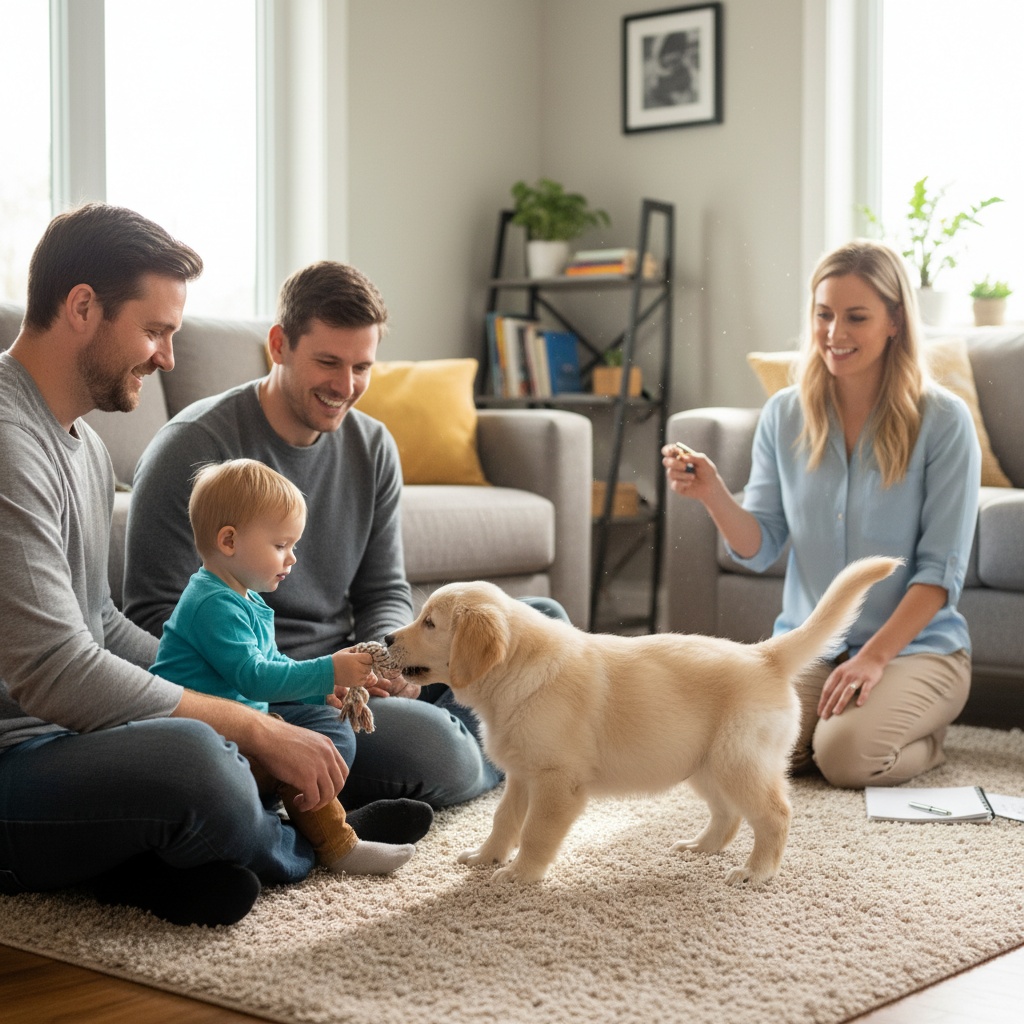
Understanding the Investment: Cost vs. Value
Training costs vary widely across PEI. When evaluating any training program, consider:
- Will this program address my specific concerns, or will I need additional help later?
- What’s included in the price (assessment, materials, follow-up support)?
- What are the potential costs of unresolved behavioural problems (damage, vet bills, stress, rehoming)?
- Am I paying for certified expertise or basic instruction?
- Will this prevent problems or just address surface symptoms?
The value of professional training: Faster, more reliable results from evidence-based methods, prevention of serious behavioural problems before they develop, lifelong skills and relationship foundation, ongoing support as challenges arise, and peace of mind for your whole family.
When to Choose Professional Behaviour Training
Certain situations benefit significantly from professional, individualized training:
- You want to prevent behavioural problems before they develop (the most common and best reason)
- Your puppy is in the critical 8-16 week window
- You’re a first-time dog owner and want comprehensive guidance
- Your puppy has specific challenges (excessive biting, house training struggles, separation anxiety)
- You have specific goals (therapy dog, service dog, advanced training)
- Your puppy shows early signs of fear, anxiety, or reactivity
- You want ongoing support throughout your dog’s life
Local Expertise: Why Charlottetown and PEI Matter
Training in Charlottetown and across PEI comes with unique considerations that local professionals understand:
- Local leash laws and regulations
- Best dog-friendly locations for training practice
- Seasonal challenges specific to PEI weather
- Community resources and veterinary partnerships
- Common issues in the local dog population
At Spot On Dogs, we contribute to Charlottetown’s dog-friendly community by promoting responsible dog ownership, supporting local veterinary professionals, creating well-behaved dogs that are welcome in public spaces, and educating the community about modern, humane training methods.
The Spot On Dogs Approach
At Spot On Dogs, we believe every dog deserves the best possible start in life and every family deserves to enjoy a strong, positive relationship with their canine companion.
When PEI families choose Spot On Dogs, they’re choosing:
- Professional expertise backed by advanced certifications (CBCC-KA, KPA-CTP, Atlas-CT, CDBC-IAABC)
- Exclusively force-free, science-based positive reinforcement methods
- Individualized programs tailored to their unique needs
- Comprehensive support throughout their dog’s life
- A local team that understands the Charlottetown and PEI community
- Results that create lasting positive change
Our commitment: We NEVER use prong collars, shock collars, choke chains, or other aversive tools. We NEVER use corrections, leash pops, or punishment-based methods. Our methods are based on current animal behavior science, and we believe all training goals can be achieved through positive reinforcement.

Ready to Get Started?
Whether you’re bringing home a new puppy or addressing challenges with your current dog, we’re here to help you make informed decisions about training. We offer behaviour consultations where we assess your specific situation and recommend the approach that will work best for your family.
Your dog’s education is an investment in your family’s happiness and your community’s well-being. Contact Spot On Dogs today to schedule a consultation and discover how professional, science-based training can make a difference for your family.
For more detailed information, read our related articles:
- “What Professional Dog Training Certifications Mean (And Why They Matter in PEI)”
- “The Critical 10-16 Week Puppy Window: Why Timing Matters for Training”
- “Red Flags: How to Spot Unethical Dog Trainers in PEI”
